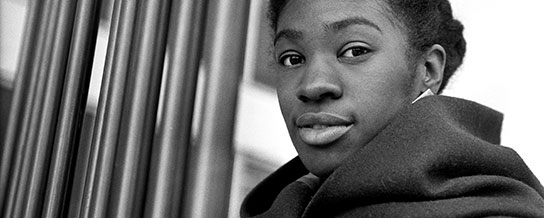Muhsinah: Defying R&B
If there’s one thing that Muhsinah Abdul-Karim knows well, it’s the death-defying balancing act of […]

Muhsinah: Defying R&B
If there’s one thing that Muhsinah Abdul-Karim knows well, it’s the death-defying balancing act of […]

If there’s one thing that Muhsinah Abdul-Karim knows well, it’s the death-defying balancing act of the aspiring musician. “Last year, I was working 12-hour days as an audio engineer at this audio-books studio,” she recalls. “While they’re reading, I’m supposed to be reading along. But I would just press record and doze off! I was the worst employee!” She can afford to laugh about it now, but the 24-year-old singer-songwriter/producer/engineer is no stranger to the task of forcing square pegs into round holes.
After attending high school at Washington, DC’s Duke Ellington School of the Arts, Muhsinah entered the prestigious halls of Howard University. Musical alumni such as Roberta Flack and Donny Hathaway acted as default inspirations as Muhsinah struggled to find her own voice. Literally. “I didn’t really get good until I got to Howard,” she recalls. “But I was only playing piano; I wasn’t singing at all. No one had ever heard me sing.” With the FM dial brimming with the high-octave ranges of Mary J. Blige and Beyoncé, Muhsinah’s own deep register struck a dissonant chord with her self-confidence. “I would think to myself, ‘I’m not good at this. My voice is too low, so I’m not gonna sing in front of anybody.’”
The insecurities eventually fell away as she worked as a backup singer for R&B artist Raheem DeVaughn, and word of her angular creations spread throughout DC’s bohemian contingent. In 2005, she released the self-produced Oscillations EP, followed up this February by a self-produced full-length, Day.Break 2.0, that’s a beautiful smack in the face of mainstream hip-hop and R&B convention. Tracks like “Discovery,” with its reverse waveforms and hefty boom bap, and the bossa nova-infused “Only and Always” testify to an effervescent musical frontier being explored by Muhsinah and a growing cadre of progressive African-American artists.
Unique as her style may be, comparisons to fellow avant-soul artist Georgia Anne Muldrow are inevitable. “The first time I heard her, it was like a soul-shattering experience,” she concedes. “You know when someone comes up with an invention and you’re like, ‘I thought of that!’? I love Georgia so much as a person–meeting her was like meeting a long-lost relative–but we’re two totally different artists.”
And it shows, as Muhsinah is no longer afraid to embrace her individuality. “There are a lot of people who don’t know about me, and a lot of people who won’t know about me,” she says. “But my intention was never to seek approval. It was just to learn and try something new.”

